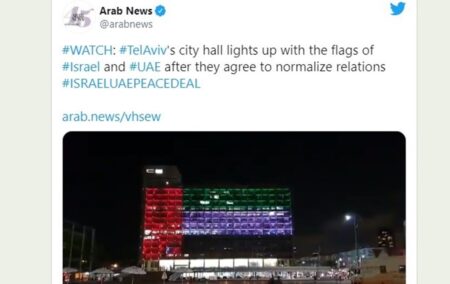The peace treaty brokered by the United States between Israel and the United Arab Emirates (UAE) represents a ‘massive change’ in political relationships in the Middle East, according to President Donald Trump’s chief adviser Jared Kushner.
Kushner said the deal would make the region safer, according to a BBC report.
The deal is described as only the third Israeli-Arab peace treaty in the Middle East, and the first involving a Gulf state.
It was welcomed by the international community and key Arab states such as Egypt, Bahrain and Oman, but denounced by the Palestinians, Iran and Turkey.
Israeli Prime Minister Benjamin Netanyahu hailed what he called a ‘new era of Israeli relations with the Arab world’, and said other deals with Arab countries would follow.
‘Together, with our joint strengths, we can bring a great future for our peoples and our region. This is very important for our economy, the regional economy and our future,’ he said.
In terms of the deal, due to be signed in three weeks’ time, the two nations will normalise relations, including opening embassies, economic exchanges, direct flights and more.
Kushner was reported as saying the agreement was ‘a very big victory’ for Trump, and would make ‘the whole region more hopeful’.
The BBC noted that, in addition to establishing full diplomatic relations between the two countries, the agreement ‘significantly … also puts the brakes on one of the most divisive issues in years between Israel and the Palestinians – Israel’s planned annexation of parts of the occupied West Bank’.
It said Israeli Prime Minister Benjamin Netanyahu had vowed to ‘extend Israeli sovereignty’ over some 30% of the West Bank – land claimed by the Palestinians for a future independent state – in line with Trump’s so-called Vision for Peace.
Palestinians feared such a move would be a death-blow for a state of their own, and while it was widely expected to have happened to some extent by now, it had not received final approval from Washington and so appeared to have stalled.
As part of the treaty with the UAE, Israel agreed to suspend plans to annex territory in the West Bank – occupied by Israel since the 1967 Middle East war – at the request of Donald Trump.
UAE Minister of Foreign Affairs Dr Anwar Gargash described his country’s recognition of Israel as ‘a very bold step’ to stop what he called the ‘ticking time bomb’ of Israel’s annexation of parts of the West Bank.
A senior UAE official told The Times of Israel that Abu Dhabi remained committed to the establishment of a Palestinian state and the terms of the Arab Peace Initiative.
Netanyahu said he would continue to seek to extend Israeli sovereignty to parts of the West Bank, but acknowledged that his plan for unilateral annexation was being temporarily halted.
He added that the agreement reflected a dramatic change in the way Israel was being perceived in the region.
‘There will be other Arab and Muslim states that will join the circle of peace with us,’ he predicted. Israel and moderate states in the region ‘stand aligned in favour of advancement and against the extremist forces that threaten us and world peace’.

